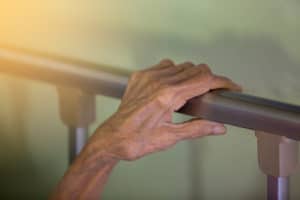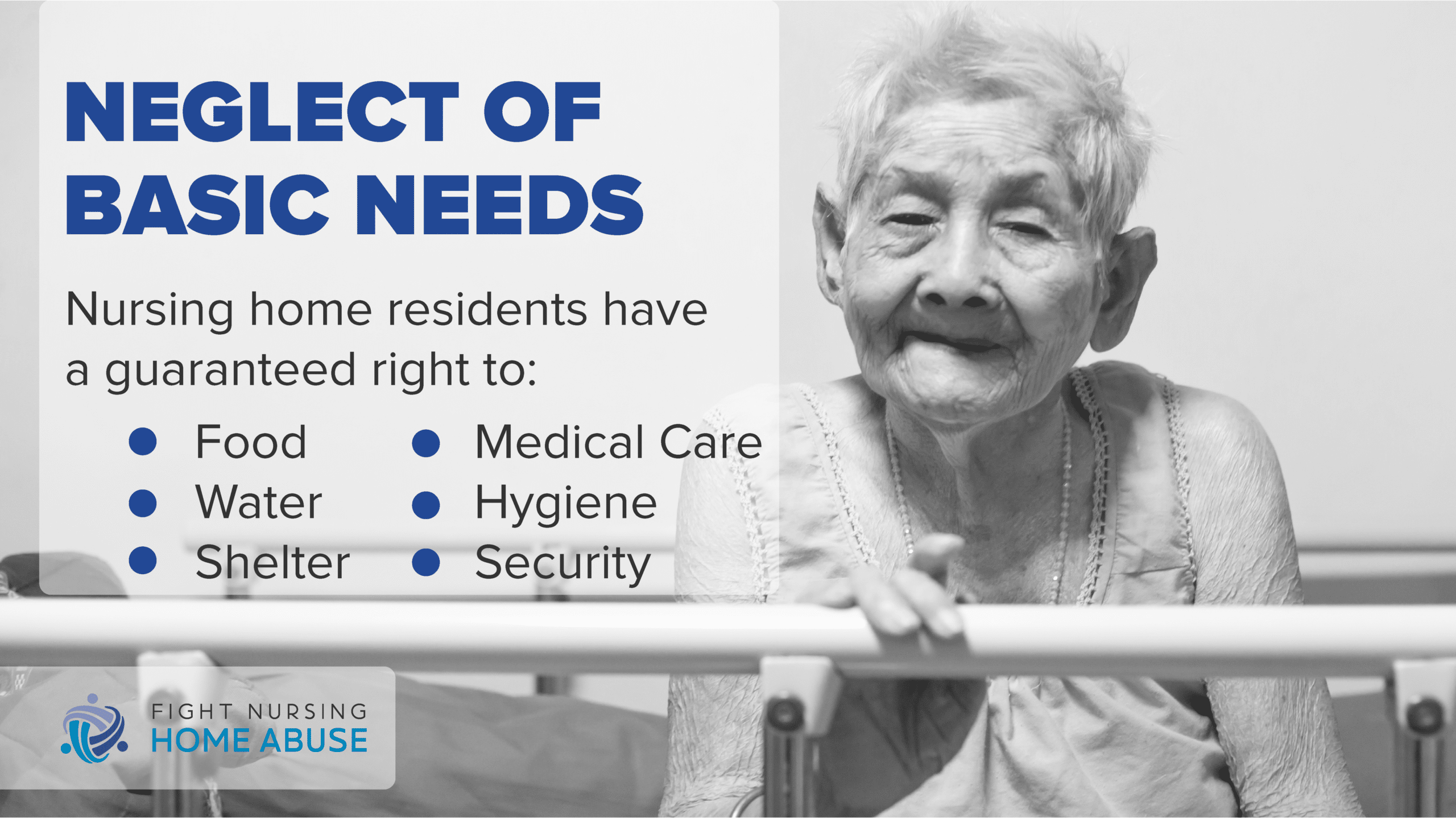Neglect of Basic Needs

When a nursing home or residential care facility fails to provide a resident’s basic needs, such as food, water, safety and comfort, the facility commits a form of nursing home neglect. Neglect of basic needs in nursing homes can cause physical and psychological injuries that elderly adults may struggle to recover from.
If you or someone you love is suffering from a neglect of basic needs in a nursing home, a nursing home abuse lawyer can help you hold the negligent party accountable for their actions. Call 1-866-548-9636 today for help.
Understanding the Basic Needs of Nursing Home Residents
Generally, basic needs neglect is a caregiver’s or nursing home’s failure to provide the basic services necessary to protect residents from physical or psychological harm.

The minimum basic needs for older adults in residential care include:
- Water
- Food
- Shelter
- Safety
- Comfort
- Personal hygiene
- Toileting
- Clean clothing
- Clean bedding
- Movement
- Health care
Safety encompasses a variety of needs, including:
- Clear walking paths
- Functional furniture & equipment
- Secured facility
- Adequate lighting
- Safe transfers
- Protection from abuse
Federal guidelines establish basic residents’ rights and, today, most states have also adopted guidelines for basic rights and needs. These rights typically include the right to:
- Dignity
- Respect
- Freedom
- Self-determination
- Privacy
- Communication
- Visits
- Social interaction
These additional needs are important for the emotional wellbeing of elder adults in long-term residential care. However, unless a nursing facility meets at least the basic physical needs described above, residents can experience a variety of serious health problems.
Risks Associated With the Neglect of Basic Needs in Nursing Homes
When older adults fail to have their basic needs met, they may experience a variety of acute and chronic health problems. Some of the signs of neglect of basic needs include:
- Dehydration and malnutrition
- Bedsores
- Infections
- Dental problems
- Restricted mobility
- Bruises & lacerations
- Fractures & dislocations
- Recurring illness
- Head injuries
- Strangulation
- Wrongful death
Residents can also develop psychological problems such as anxiety and depression. They can become withdrawn and fearful, develop insomnia, and even develop suicidal ideations.
Reasons Elder Adults Often Suffer Basic Needs Neglect in Nursing Homes
Basic needs neglect in the residential care setting can occur for a variety of reasons. Some of the most common are as follows:
Understaffed Residential Care Facilities
Nursing homes frequently fail to meet the basic needs of residents merely because they lack the staff to care for those in their care adequately. This may occur due to budget shortfalls, poor scheduling practices, employee turnover and poor facility management.
Caregiver Burnout
When nursing home staff members are overworked or battling management issues, burnout and stress develop. Under these difficult conditions, staff may not realize they are not properly caring for residents or, sadly, cannot do anything about it.
Insufficient Staff Training
Nursing homes have notoriously high employee turnover. Often, new staff members are expected to meet the needs of residents without the benefit of adequate training. Inexperienced employees may not realize they are neglecting residents.
Personal & Mental Health Issues
Some nursing home employees may have problems at home that negatively affect the quality of their work. Others have mental health issues or have experienced some form of abuse in their past that they take out on innocent residents.
Whatever the reason for it, nursing home residents should never have their basic needs neglected. Residential care facilities have a legal obligation to provide a reasonable standard of care for residents – and that includes satisfying residents’ basic needs. If the facility neglects a resident’s basic needs, they likely have liability for economic and non-economic damages that result.
Signs of Basic Needs Neglect in Nursing Homes
Unlike some forms of nursing home abuse, the signs of neglect are typically obvious to family members and visiting friends. Some of the most common signs of basic needs neglect include:
- Dirty clothes
- Soiled bedding
- Foul body odor
- Persistent bad breath
- Extreme weight loss
- Recurring thirst
- Dry or cracked lips
- Lack of wound care
- Soiled undergarments
- Pressure ulcers (bedsores)
- Decreased mobility
- Unexplained injuries
Family members should also take note of any hazardous or unsanitary facility conditions, as these can also indicate basic needs neglect. For example, obstructions and liquid spills in walkways can suggest that the facility is failing to provide a safe environment.
Another red flag is the ability for residents to slip away from the facility or off the property (known as elopement). This is a strong indication that the facility does not provide the basic security that residents deserve.
Finally, if a loved one living in residential care becomes suddenly withdrawn or exhibits an unwillingness to communicate, it could indicate the facility is neglecting their basic needs.
Getting Help for a Victim of Basic Needs Neglect
If you have any reason to believe your loved one’s safety is at risk immediately, call 911 or local authorities. Other options for addressing the neglect of a loved one’s basic needs in residential care include:
- Reporting your concerns to the facility, as administrators must investigate all reports of suspected neglect or abuse.
- You can bring your concerns to the victim’s doctor or another medical practitioner, who has a legal obligation to report neglect and abuse to the proper authorities.
- You can also try contacting your local adult protective services or long-term care ombudsman.
Unfortunately, you may discover that nothing changes as a result.
Talk to a Nursing Home Abuse Lawyer
If you feel that your loved one is being neglected, consider talking to a nursing home abuse lawyer to learn what other options you may have. A lawyer can recommend the best course of action to stop the neglect and get the victim the services and resources they need. A lawyer will also launch their own investigation into the facility and their treatment of your loved one and help you get the victim to safety, if necessary.
At Fight Nursing Home Abuse, our nursing home abuse lawyer provides a variety of invaluable services, include:
- Investigating and documenting basic needs neglect
- Identifying the at-fault party and proving liability
- Calculating all physical, emotional and economic damages
- Filing a malpractice, personal injury or wrongful death claim
- Fighting to recover fair financial compensation for damages
Although a settlement will not undo the damage your loved one suffered, it will provide the resources you need to obtain proper medical treatment and help secure their future.
To learn more, call 1-866-548-9636 now for a free, no-obligation consultation.



